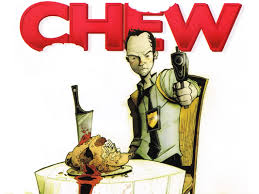记忆方法
记忆“chew”的方法可以是将它与咀嚼的动作相联系。想象自己在“chew”一块特别坚硬的饼干,口中的咀嚼声和动作帮助记忆这个单词的含义,即“咀嚼”。
以上内容由AI生成, 仅供参考和借鉴
中文词源
chew 咀嚼
来自PIE*gyeu, 咀嚼,词源同cheek.
英语词源
- chew
-
chew: [OE] Chew, and its Germanic relatives German kauen and Dutch kauwen, can be traced back to a prehistoric West Germanic *kewwan. It has relatives in other Indo-European languages, including Latin gingīva ‘gum’ (source of English gingivitis).
=> gingivitis - chew (v.)
- Old English ceowan "to bite, gnaw, chew," from West Germanic *keuwwan (cognates: Middle Low German keuwen, Dutch kauwen, Old High German kiuwan, German kauen), from PIE root *gyeu- "to chew" (cognates: Old Church Slavonic živo "to chew," Lithuanian žiaunos "jaws," Persian javidan "to chew").
Figurative sense of "to think over" is from late 14c.; to chew the rag "discusss some matter" is from 1885, apparently originally British army slang. Related: Chewed; chewing. To chew (someone) out (1948) probably is military slang from World War II. Chewing gum is by 1843, American English, originally hardened secretions of the spruce tree. - chew (n.)
- c. 1200, "an act of chewing," from chew (v.). Meaning "wad of tobacco chewed at one time" is from 1725; as a kind of chewy candy, by 1906.
权威例句
- 1. He tends to chew things over too much in his mind.
- 他这个人就爱在心里反复琢磨事儿。
- 2. Chew your food well and do not rush meals.
- 充分咀嚼食物,吃饭不要太快。
- 3. Savour the flavour of each mouthful, and chew your food well.
- 细细品尝每一口的味道,充分咀嚼。
- 4. Chew each mouthful fully before the next bite.
- 将每一口充分咀嚼后,再吃下一口。
- 5. They pause and chew their pencils.
- 他们停了下来,咬着铅笔。

